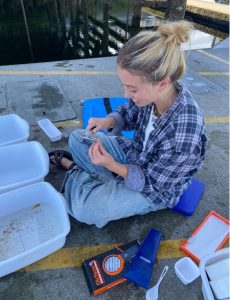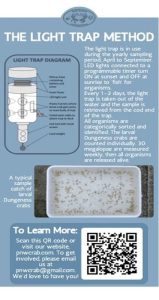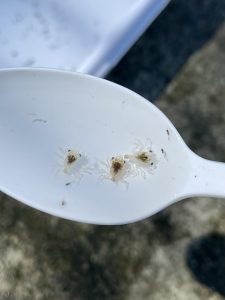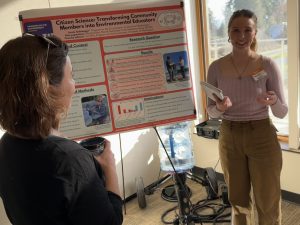Connecting Communities to (Crab) Conservation

For Annie Schlanger, a senior in Environmental Studies, her capstone project has been an eye-opening dive into the world of citizen science and Dungeness crab conservation. As part of the Pacific Northwest Crab Research Group (PCRG), Annie and other student volunteers have been collecting valuable data to help improve our understanding of the early life stages of Dungeness crabs—an iconic species in the Salish Sea, vital to both the ecosystem and local fisheries.
Through PCRG’s larval Dungeness crab monitoring program, Annie and a team of community scientists have been using light traps to capture megalopae—larval crabs at their final stage before they settle into their juvenile form. But it’s not just about counting crabs. It’s about something deeper: building connections between the public and the ecosystems they rely on. And that’s exactly what Annie’s work explores.
Her capstone project focuses on how citizen science—where community members step up as researchers—can also turn participants into environmental educators. While working with PCRG, Annie realized how powerful it is to not only engage volunteers in data collection but to help them translate their newfound knowledge into educational opportunities for others. In fact, her research found that volunteers don’t just learn about the species they’re studying—they share their knowledge with friends, family, and fellow community members, spreading the word about the importance of Dungeness crabs and the science behind the project.

“I found that 80% of volunteers felt confident about teaching others about the project”, said Annie, referring to results of a survey she conducted of program volunteers.
Annie’s contribution to PCRG doesn’t stop there. She created a “rack card” for volunteers—an easy-to-use tool to help them communicate with the public about the project. This card, which will be distributed at over 60 light trap monitoring sites throughout the region, contains key information about the project and a QR code to help others get involved. It’s a simple yet effective way to ensure that volunteers can easily share what they’re learning and inspire others to take part in the effort.
But perhaps the most exciting part? Preliminary results from the Dungeness crab monitoring program were published in Fisheries Magazine on January 22, 2025. And just a few days later, Annie presented her work at the 2025 Winter Meeting of PCRG. It’s an exciting time, not only for Annie but for the entire PCRG team, as they continue to build a long-term dataset that will help inform sustainable fisheries management and ecosystem conservation efforts in the region.
Annie’s capstone journey was shaped by the guidance of her site supervisor, Alexandra Galiotto, a Program on the Environment alumna who is now the PCRG program assistant and a co-author on the paper in Fisheries Magazine. She also received advice from Program on the Environment (POE) faculty advisor, Tim Billo. Their experience and mentorship have played a key role in helping Annie connect her research to the broader community conservation efforts. P. Sean McDonald, Annie’s capstone instructor and another POE faculty, is also a co-author of the PCRG paper. As a member of the PCRG coordinating committee, P. Sean has been a consistent advocate for the power of community science and has helped bring this project to life.

Through her work with PCRG, Annie has learned that science is as much about community as it is about data. The impact of her capstone project reaches beyond just the numbers. By helping to connect the public with local science projects and encouraging everyone to become a part of the solution, Annie is helping to inspire a new generation of environmental stewards.
“The experience of being a part of participatory science is enough to give community members the knowledge they need to teach others,” shared Annie. “Now we just need networks to give their volunteers the tools and opportunities necessary to practice and hone their skills.”
This project is a perfect example of how collaboration, community engagement, and hands-on science come together to create real change. And who knows? The next time you find yourself at a marina or beach in the Salish Sea, you might just run into one of Annie’s fellow volunteers, eager to share the wonders of Dungeness crab research with you.
If you are a UW student interested in participating in monitoring for the 2025 season, then apply here. Priority application deadline is March 1st. Contact psean@uw.edu with questions. More information about recent research can be found here.
